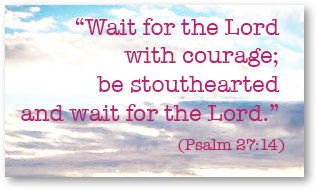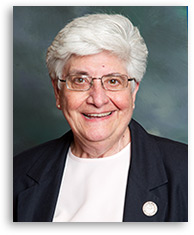Readings: Acts 1: 12-14; Psalm 27; 1 Peter 4:13-16; John 17: 1-11a
 As we begin today’s first reading from the Acts of the Apostles, we find the eleven disciples in Jerusalem in the upper room along with Mary and some other women and other disciples. The time between the Ascension and Pentecost is one of waiting, and it calls each of us to examine our attitudes towards waiting in general and waiting on God’s action in our lives. Waiting is difficult. We who live in an instantaneous society find any kind of waiting annoying and often look to shorten the time.
As we begin today’s first reading from the Acts of the Apostles, we find the eleven disciples in Jerusalem in the upper room along with Mary and some other women and other disciples. The time between the Ascension and Pentecost is one of waiting, and it calls each of us to examine our attitudes towards waiting in general and waiting on God’s action in our lives. Waiting is difficult. We who live in an instantaneous society find any kind of waiting annoying and often look to shorten the time.
What was it like to wait in the upper room? Imagine how this is a special place filled with memories of Jesus, of the Last Supper, of the foot-washing. This is the room where they listened to Jesus speak farewell words that were assuring, and made them wonder about the future without him. This is the place that afforded them refuge from the enemies of Jesus after the crucifixion, and where they processed the news of the resurrection. And now in this room filled with familiar faces, the absence of the one who brought them together in the first place, is felt keenly. This is the place to come and regroup because deep down there is a desire not to lose the thread of connection.
Waiting can be lonely. One of the best ways to wait is with someone else. We are told that the disciples gathered with other believers. They prayed together. But we can only imagine that they also shared memories and emotions and plans. What exactly was that commission they heard on the mount of the Ascension? Community helps us to remember events and words shared. The meanings of the miracles of Jesus they witnessed during the three years with him are now a little clearer. Being together makes the time go by especially when you don’t know exactly what is coming next but you know the future is not a repeat of the past.
Emotions come to the fore when you spend time with friends. The twelve are now eleven. They were hurt and betrayed by someone they had loved and trusted. They need to find someone to take Judas’ place to restore and heal what was broken. When we wait, we have lots of time to think, and in these moments, we remember people and events that may have hurt us, and the pain associated with those hurts. The waiting helps us get in touch with these dull aches, and we can almost feel God filling our emptiness. Waiting is healing.
Waiting is not an empty time. Imagine how the followers of Jesus were prepared for Pentecost as they internalized the lessons of Jesus’ life, death, and resurrection. Next week when we will hear that the time for Pentecost has arrived, think back to this rich time of waiting and internalization experienced by the followers of Jesus and ourselves.
Do we have special places of remembrance and sanctuary? Do we go there when we need to wait for God to speak to our hearts? Let us savor these days of preparation for Pentecost.
—Sister Dominica Rocchio, SC
 Sr. Dominica, most recently a member of the Congregation’s leadership team, has ministered in education as a teacher, principal, and in administrative positions in the archdioceses of New York and Newark, NJ. In Newark, she served as Superintendent of Schools and Secretary for Education. At present, she works on Special Projects for the Congregation.
Sr. Dominica, most recently a member of the Congregation’s leadership team, has ministered in education as a teacher, principal, and in administrative positions in the archdioceses of New York and Newark, NJ. In Newark, she served as Superintendent of Schools and Secretary for Education. At present, she works on Special Projects for the Congregation.

Thanks a lot dear Sister. You really spoke to me the Word of God. God bless you abundantly